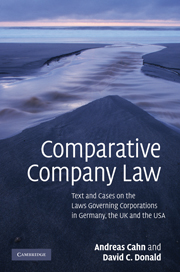 Comparative Company Law
Comparative Company Law Book contents
- Frontmatter
- Contents
- List of figures
- List of tables
- Preface and acknowledgments
- Glossary
- List of abbreviations
- Table of cases
- Table of legislation
- PART I The essential qualities of the corporation
- PART II The corporation and its capital
- PART III Governing the corporation
- SUBPART A The management
- 10 An introduction to the board and its governance
- 11 Directors' power to represent the company
- 12 Directors' duties of loyalty, good faith and care
- 13 Judicial review of management decisions (the business judgment rule)
- 14 Executive compensation
- 15 Directors' duties in listed companies
- SUBPART B The members
- PART IV Corporate combinations, groups and takeovers
- References
- Index
14 - Executive compensation
from SUBPART A - The management
- Frontmatter
- Contents
- List of figures
- List of tables
- Preface and acknowledgments
- Glossary
- List of abbreviations
- Table of cases
- Table of legislation
- PART I The essential qualities of the corporation
- PART II The corporation and its capital
- PART III Governing the corporation
- SUBPART A The management
- 10 An introduction to the board and its governance
- 11 Directors' power to represent the company
- 12 Directors' duties of loyalty, good faith and care
- 13 Judicial review of management decisions (the business judgment rule)
- 14 Executive compensation
- 15 Directors' duties in listed companies
- SUBPART B The members
- PART IV Corporate combinations, groups and takeovers
- References
- Index
Summary
Required reading
D: AktG, §§ 78, 87, 112, 186(3), 192, 193; HGB, § 285
UK: CA 2006, secs. 188, 420–422, 439, 566, 1166; SI 2008 No. 410; FSA Listing Rules, Rules 9.4, 9.86, 9.8.8
US: DGCL, §§ 122(15), 141(h); 17 CFR §§ 229.402, 240.14a-101, Items 8 and 10; NYSE, Listed Company Manual, para. 303A.05
Incentives and risks of executive compensation
Performance-linked pay and moral hazard
Executive compensation can be used to create desirable incentives for management, and thus is an instrument of corporate governance, but, because management often controls the machinery used to grant itself compensation and also because of the nature of certain forms of compensation, it can equally present moral hazard – an incentive for directors to breach their fiduciary duties. Performance-linked compensation can align the interests of management with those of shareholders because a manager whose pay increases in relation to a company's success has an economic incentive to increase such success by her own performance. A manager who holds the company's shares or options to buy them can be expected to share the interests of the shareholders. On the other hand, giving directors shares and options can set the stage for governance risks that do not arise with a straight salary.
Compensation contracts entail the same risks as any contract between the directors and the company: directors stand on both sides of the transaction in setting their own pay, and, when setting officers' pay, their decisions may be influenced by such officers.
- Type
- Chapter
- Information
- Comparative Company LawText and Cases on the Laws Governing Corporations in Germany, the UK and the USA, pp. 416 - 441Publisher: Cambridge University PressPrint publication year: 2010


